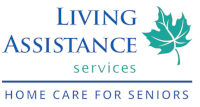Nutrition is important to wellness at every age, but seniors in particular need to pay close attention to their diet. They may be eating less throughout the day, which makes each meal or snack even more important, or they may have specific dietary concerns related to conditions like high blood pressure or diabetes. Once you throw in food restrictions related to common prescription drugs like Lipitor (a statin that treats high cholesterol), you’ve got a lot to think about!
Here are some ways to determine whether or not your aging loved one is getting adequate nutrition and if not, how to best support them. Remember, these tips also apply to younger individuals—so consider them for yourself as well! Gut health has been scientifically linked to mental health and overall wellness, so eating well and caring for your digestive system is incredibly important. Here’s where to start—and if you’d like to speak to our team about homecare services in Toronto and the surrounding areas, please contact us. We’d be pleased to assess your needs and provide a quote.
Assess their food intake
Start by assessing your aging family member’s food intake. This doesn’t need to be formal—you can simply make a mental note of what and how much they eat when sharing meals. Do they pick at their plate or avoid vegetables? Do they rely on simple carbs or prepared items for convenience? This observation should be done over the course of a few days or weeks in order to get an accurate picture as one day (or one meal) won’t tell the whole story. If your loved one has dementia or significant physical challenges that require care, consider keeping a journal so family members and other caregivers can keep track of what’s been offered and consumed over a period of time.
Ask about their gut health
Having a healthy diet isn’t just about eating well—it’s about feeling good, too. Some bodies react poorly to specific foods or food groups, so it’s important to consider your loved one’s digestive health and sense of well-being. If they’re suffering from bloating, constipation, diarrhea, nausea or other digestive issues, encourage them to speak to their doctor and/or consult a nutritionist or dietitian for personalized advice. They may end up needing to eat more fibre, reduce their dairy intake or otherwise tweak their meal plan. And, as we mentioned earlier, there are clear links between gut health and wellness including depression and anxiety. Trust us—it’s worth taking the time to care for your gut!
Set nutritional goals
If your loved one is eating a balanced diet with plenty of protein, fresh produce and whole grains and doesn’t suffer from any digestive issues or medical complications, you probably don’t have anything to worry about. But if there’s room for improvement, consider writing down a meal plan that addresses the gaps in their diet. This may mean adding more fresh fruit and vegetables, reducing salt or processed foods, increasing their protein intake or simply drinking more water. Stock their fridge and pantry with these items and ask your loved one’s caregivers to encourage healthy eating. We recommend getting advice from a medical professional who specializes in nutrition, like a registered dietitian (RD) or similar care provider before designing any meal plans or adding/eliminating different foods.
Ask them how you can help
Finally, don’t forget to include your aging loved one in these conversations. Ask them how you can help them build healthier habits—it may be that they don’t enjoy a certain flavour or texture, or they want to eat smaller, more frequent meals. They may be struggling to chew certain foods or be dealing with a loss of appetite due to a prescription they’re taking. Or, they may be craving specific dishes but not have the energy to make them! Ask questions, reserve your judgement and play a supportive role to help them succeed. Encouragement always works better than shaming or asserting control over someone else’s diet. At Living Assistance Services, we understand the importance of autonomy in a senior’s life—so, instead of taking over, ask how you can help and take an approach that empowers and encourages your loved one. Thanks for reading, and please contact us if you have any questions about how our caregivers can support your loved one’s healthy eating habits.

